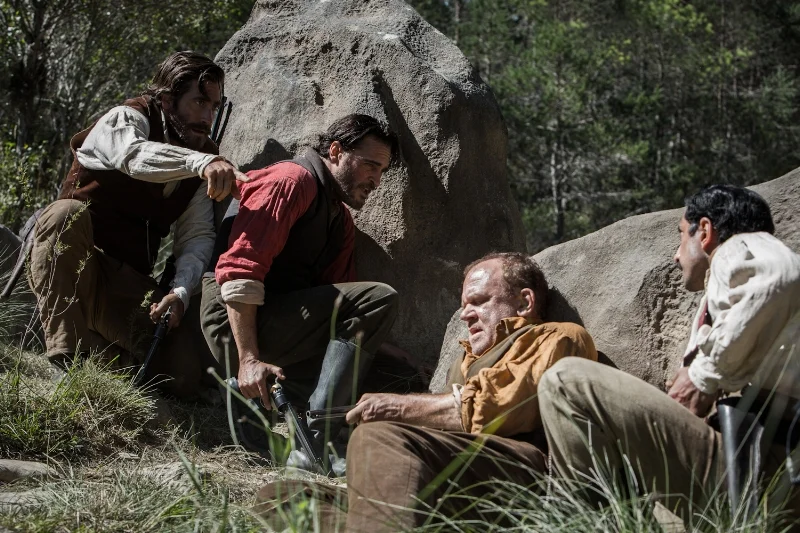THE SISTERS BROTHERS
Directing: B+
Acting: B+
Writing: B+
Cinematography: B+
Editing: B+
How many American Westerns have been made? Hundreds, surely — probably thousands. It’s a genre that became the first example of American mythology in motion pictures, pre-dating the likes of Star Wars, which dominated the culture in the late 20th century, and superhero movies, which dominate the culture in the early 21st. The Western, which used to be churned out at breakneck speed, waned in cultural significance decades ago. If you want to make one now, and have people pay attention, it really has to stand apart, particularly from the countless Westerns that preceded it.
And so we get to The Sisters Brothers, which is a Western merely as a backdrop. You could more accurately call it a period piece, a costume drama set in Oregon and Northern California in the 1850s. The costumes happen to be those of the American Old West, not exactly cowboy, although they certainly get around on horses. There are no Native American characters in this story. This is about early gold rush prospectors, paid killers, and paid-killers-turned-prospectors. Even those are backdrop details, as this is most specifically about the relationship between two brothers, Eli (John C. Reilly) and Charlie (Joaquin Phoenix), who share the last name of “Sisters.”
They’re excellent at what they do. The Sisters Brothers opens with a wide shot, kept static and wide as the viewer witnesses an ambush on a house in a wide field at night, bright flashes of gunfire seen at random spots on the screen, barely illuminating their immediate area for split seconds. The Sisters Brothers are two against many, contracted to kill only one of the men in this house, and they win.
They also don’t exactly have other careers to fall back on. They have only each other. They are incredibly close, they get under each other’s skin — but in subtle, believable ways that make it easy to believe these two are brothers. They share a tragic past within their family that set them on this path.
Here is another film with frustratingly misleading marketing. The trailers make The Sisters Brothers look way more “fun” than it actually is, featuring self-conciously cool, snappy editing that does nothing to represent the film itself, which is something far deeper, far more contemplative. Particularly for a Western, this is much more a work of art than of action. Gun fights are messy. Horrible accidents happen.
If nothing else, The Sisters Brothers ultimately demonstrates how truly random one’s life trajectory can be. Where these characters wind up in the end is nowhere near any typical Western of yesteryear would take them. There is neither catharsis nor blowout, no particular epiphanies or breakthroughs.
There are certainly fascinating detours. Eli and Charlie have set out to meet up with a tracker named John Morris (Jake Gyllenhaal), who has in turn captured a prospector, Hermann (Riz Ahmed) who has come up with a chemical formula that can be used to illuminate gold in a stream at night. Director and co-writer Jacques Audiard, here making his first English language feature film, has a knack for sprinkling details indicative of larger themes rarely made explicit in his storytelling. After Hermann demonstrates how he prospects with these chemicals, we briefly see the stream the following morning, littered with dead fish. Where might this stream be carrying that crap?
There are several unforgettable images from this film. A horse escaped from a burning barn, itself set aflame. In one truly horrifying scene, we see a spider crawl right into the mouth of a man sleeping by a fire. At first this seems like it’s just a random detail, but like the butterfly that changes the weather around the world, these are details that matter, setting off subtle differences in each event that follows. And really, it is a random detail. It is also important to the story.
As well constructed as this film undeniably is, I struggle to think who it’s for, exactly. It has moments of dark beauty, one or two moments of subtly dark humor, a few chaotic gun fights. There’s a pretty high body count, many of the deaths senseless, or at best the result of people knowingly yet foolishly trying to get in the Sisters Brothers’ way.
And then, in the end, after being robbed of a climax they only thought they were headed for, The Sisters Brothers ends on a surprising note of sweetness, featuring a brief appearance by Carol Kane. Rutger Hauer appears as the Commodore, the brothers’ employer, and even more briefly: only twice, at different points in the movie, from a distance. He doesn’t even having any lines. The focus is always squarely on the brothers, even during the first half when Hermann and John are intercut as a sort of “B story.”
There’s a lot to consider in The Sisters Brothers, although considering it all is not necessary to appreciate the film. Suffice it to say that the four leads all give solid performances, each of them uniquely nuanced. Any movie set in the American West made in the 21st century must indeed have something unique to offer, and this one is certainly a far cry from brainless entertainment. Honestly if that’s what you’re looking for, this will bore you. I found myself appreciating how it meanders with a purpose, and found its conclusion oddly satisfying considering how surprisingly subdued it is in the end.
There’s a lot more going on here than you might think.
Overall: B+


